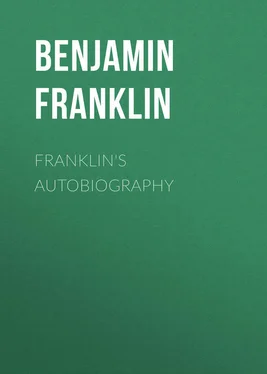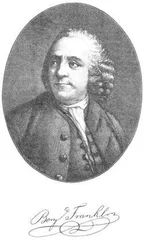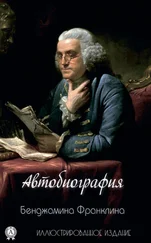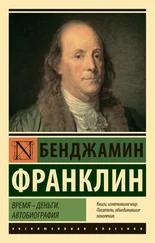Бенджамин Франклин - Franklin's Autobiography
Здесь есть возможность читать онлайн «Бенджамин Франклин - Franklin's Autobiography» — ознакомительный отрывок электронной книги совершенно бесплатно, а после прочтения отрывка купить полную версию. В некоторых случаях можно слушать аудио, скачать через торрент в формате fb2 и присутствует краткое содержание. Издательство: Иностранный паблик, Жанр: История, foreign_antique, foreign_prose, на английском языке. Описание произведения, (предисловие) а так же отзывы посетителей доступны на портале библиотеки ЛибКат.
- Название:Franklin's Autobiography
- Автор:
- Издательство:Иностранный паблик
- Жанр:
- Год:неизвестен
- ISBN:нет данных
- Рейтинг книги:3 / 5. Голосов: 1
-
Избранное:Добавить в избранное
- Отзывы:
-
Ваша оценка:
- 60
- 1
- 2
- 3
- 4
- 5
Franklin's Autobiography: краткое содержание, описание и аннотация
Предлагаем к чтению аннотацию, описание, краткое содержание или предисловие (зависит от того, что написал сам автор книги «Franklin's Autobiography»). Если вы не нашли необходимую информацию о книге — напишите в комментариях, мы постараемся отыскать её.
Franklin's Autobiography — читать онлайн ознакомительный отрывок
Ниже представлен текст книги, разбитый по страницам. Система сохранения места последней прочитанной страницы, позволяет с удобством читать онлайн бесплатно книгу «Franklin's Autobiography», без необходимости каждый раз заново искать на чём Вы остановились. Поставьте закладку, и сможете в любой момент перейти на страницу, на которой закончили чтение.
Интервал:
Закладка:
Benjamin Franklin
Franklin's Autobiography (Eclectic English Classics)
INTRODUCTION
When Franklin was born, in 1706, Queen Anne was on the English throne, and Swift and Defoe were pamphleteering. The one had not yet written "Gulliver's Travels," nor the other "Robinson Crusoe;" neither had Addison and Steele and other wits of Anne's reign begun the "Spectator." Pope was eighteen years old.
At that time ships bringing news, food and raiment, and laws and governors to the ten colonies of America, ran grave chances of falling into the hands of the pirates who infested the waters of the shores. In Boston Cotton Mather was persecuting witches. There were no stage coaches in the land, – merely a bridle path led from New York to Philadelphia, – and a printing press throughout the colonies was a raree-show.
Only six years before Franklin's birth, the first newspaper report for the first newspaper in the country was written on the death of Captain Kidd and six of his companions near Boston, when the editor of the "News-Letter" told the story of the hanging of the pirates, detailing the exhortations and prayers and their taking-off. Franklin links us to another world of action.
His boyhood in Boston was a stern beginning of the habit of hard work and rigid economy which marked the man. For a year he went to the Latin Grammar School on School Street, but left off at the age of ten to help his father in making soap and candles. He persisted in showing such "bookish inclination," however, that at twelve his father apprenticed him to learn the printer's trade. At seventeen he ran off to Philadelphia and there began his independent career.
In the main he led such a life as the maxims of "Poor Richard" 1 1 See pp. 198–206 .
enjoin. The pages of the Autobiography show few deviations from such a course. He felt the need of school training and set to work to educate himself. He had an untiring industry, and love of the approval of his neighbor; and he knew that more things fail through want of care than want of knowledge. His practical imagination was continually forming projects; and, fortunately for the world, his great physical strength and activity were always setting his ideas in motion. He was human-hearted, and this strong sympathy of his, along with his strength and zeal and "projecting head" (as Defoe calls such a spirit), devised much that helped life to amenity and comfort. In politics he had the outlook of the self-reliant colonist whose devotion to the mother institutions of England was finally alienated by the excesses of a power which thought itself all-powerful.
In this Autobiography Franklin tells of his own life to the year 1757, when he went to England to support the petition of the legislature against Penn's sons. The grievance of the colonists was a very considerable one, for the proprietaries claimed that taxes should not be levied upon a tract greater than the whole State of Pennsylvania.
Franklin was received in England with applause. His experiments in electricity and his inventions had made him known, and the sayings of "Poor Richard" were already in the mouths of the people. But he waited nearly three years before he could obtain a hearing for the matter for which he had crossed the sea.
During the delay he visited the ancient home of his family, and made the acquaintance of men of mark, receiving also that degree of Doctor of Civil Law by which he came to be known as Dr. Franklin. In this time, too, he found how prejudiced was the common English estimate of the value of the colonies. He wrote Lord Kames in 1760, after the defeat of the French in Canada: "No one can more sincerely rejoice than I do on the reduction of Canada; and this is not merely as I am a colonist, but as I am a Briton. I have long been of opinion that the foundations of the future grandeur and stability of the British empire lie in America ; and though, like other foundations, they are low and little now, they are, nevertheless, broad and strong enough to support the greatest political structure that human wisdom ever yet erected. I am, therefore, by no means for restoring Canada. If we keep it all the country from the St. Lawrence to the Mississippi will in another century be filled with British people. Britain itself will become vastly more populous by the immense increase of its commerce; the Atlantic sea will be covered with your trading ships; and your naval power, thence continually increasing, will extend your influence round the whole globe and awe the world!.. But I refrain, for I see you begin to think my notions extravagant, and look upon them as the ravings of a madman."
At last Franklin won the king's signature to a bill by the terms of which the surveyed lands of the proprietaries should be assessed, and, his business accomplished, he returned to Philadelphia. "You require my history," he wrote to Lord Kames, "from the time I yet sail for America. I left England about the end of August, 1762, in company with ten sail of merchant ships, under a convoy of a man-of-war. We had a pleasant passage to Madeira… Here we furnished ourselves with fresh provisions, and refreshments of all kinds; and, after a few days, proceeded on our voyage, running southward until we got into the trade winds, and then with them westward till we drew near the coast of America. The weather was so favorable that there were few days in which we could not visit from ship to ship, dining with each other and on board of the man-of-war; which made the time pass agreeably, much more so than when one goes in a single ship; for this was like traveling in a moving village, with all one's neighbors about one.
"On the 1st of November I arrived safe and well at my own home, after an absence of near six years, found my wife and daughter well, – the latter grown quite a woman, with many amiable accomplishments acquired in my absence, – and my friends as hearty and affectionate as ever, with whom my house was filled for many days to congratulate me on my return. I had been chosen yearly during my absence to represent the city of Philadelphia in our Provincial Assembly; and on my appearance in the House, they voted me three thousand pounds sterling for my services in England, and their thanks, delivered by the Speaker. In February following, my son arrived with my new daughter; for, with my consent and approbation, he married, soon after I left England, a very agreeable West India lady, with whom he is very happy. I accompanied him to his government [New Jersey], where he met with the kindest reception from the people of all ranks, and has lived with them ever since in the greatest harmony. A river only parts that province and ours, and his residence is within seventeen miles of me, so that we frequently see each other.
"In the spring of 1763 I set out on a tour through all the northern colonies to inspect and regulate the post offices in the several provinces. In this journey I spent the summer, traveled about sixteen hundred miles, and did not get home till the beginning of November. The Assembly sitting through the following winter, and warm disputes arising between them and the governor, I became wholly engaged in public affairs; for, besides my duty as an Assemblyman, I had another trust to execute, that of being one of the commissioners appointed by law to dispose of the public money appropriated to the raising and paying an army to act against the Indians and defend the frontiers. And then, in December, we had two insurrections of the back inhabitants of our province… Governor Penn made my house for some time his headquarters, and did everything by my advice; so that for about forty-eight hours I was a very great man, as I had been once some years before, in a time of public danger. 2 2 The time of Braddock's defeat.
Интервал:
Закладка:
Похожие книги на «Franklin's Autobiography»
Представляем Вашему вниманию похожие книги на «Franklin's Autobiography» списком для выбора. Мы отобрали схожую по названию и смыслу литературу в надежде предоставить читателям больше вариантов отыскать новые, интересные, ещё непрочитанные произведения.
Обсуждение, отзывы о книге «Franklin's Autobiography» и просто собственные мнения читателей. Оставьте ваши комментарии, напишите, что Вы думаете о произведении, его смысле или главных героях. Укажите что конкретно понравилось, а что нет, и почему Вы так считаете.





![Бенджамин Франклин - Время – деньги. Автобиография [litres]](/books/397995/bendzhamin-franklin-vremya-dengi-avtobiografiya-thumb.webp)




